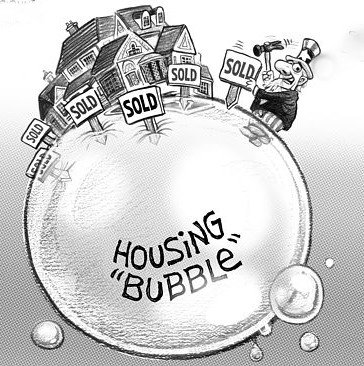The Housing Bubble Reflection
Intro
My main takeaway from this film is that principles of socialism can be present even in a system that is supposed to be capitalistic. As one person in the video said, “crony capitalism socializes risk.” Banks were not punished for subprime mortgages or risky lending. Instead, the taxpayers as a collective were punished by funding government bailouts. This is not the way a free market operates. It is the opposite of what is meant to happen in a natural economy and pollutes capitalism with socialist tendencies.
Housing Committee
The primary question raised at the beginning of the film was how the people who were outspoken against the policies of the housing committee and federal reserve could have seen the crash of the housing market coming. Each of them said the same thing. By artificially lowering interest rates and lending money that did not exist to banks to sign risky mortgages, the government inflated a bubble that was sure to burst. One commentator in the film asked why these critics were able to predict what would happen, but the housing committee and members of Congress were not. My best guess is that they most likely did know what would happen but did not care. They were only focused on making it easier for low-income individuals to afford to make a down payment on a house. In some instances, individuals were allowed to sign a mortgage with no down payment required. They wanted to push home ownership because of the political support this agenda brought. People who were previously unable to afford a home would now be able to, something many Americans would be grateful for. Instead, they brought on one of the worst recessions in America’s history and shredded many people’s home equity. This sacrifice of the economy for temporary political gain fits with the idea of crony capitalism. Using a central body to plan and control what is best for people instead of letting them choose and act for themselves is exactly what Bastiat and Hayek warned about in our past readings.
Banks
The other motive that would drive people to knowingly participate in a system of poor decisions that would harm the economy is profit. What better scenario could there be for big bankers than one where they are encouraged to increase their customers with no risk to themselves? Once they knew that they would be bailed out if the bubble burst, there was nothing stopping them from signing everyone they could to a mortgage, even with huge risks and small down payments. When their customers with poor credit ratings ended up defaulting on their loans because their adjustable-rate mortgages went up, the banks were not punished for their poor investments. In such a scenario, the only incentive they had was to make as much money as possible before the bubble burst, with no consideration for the downsides. Additionally, the profit motive extended beyond individual bankers to the broader financial industry, including credit rating agencies and Wall Street firms. Credit rating agencies, entrusted with assessing the creditworthiness of financial products, often gave inflated ratings to mortgage-backed securities and CDOs in exchange for fees from the banks issuing these securities. This conflict of interest compromised the integrity of the ratings process and contributed to the mispricing of risk in the financial system.
Government Regulation
I also thought it was interesting that the film looked at the history of our economy and some of its crashes. From a broad point of view, it seems like every time there has been a problem in our economy, it has been due to the government trying to control the market or regulate it in some way. One of the commentators mentioned how the pricing system is complex and provides important information about the market to investors. When a central body tampers with prices and interest rates, the information is skewed and leads to bad decisions. Enough bad decisions, and we end up with recession or the stagflation discussed in the 70s. Stagflation refers to a combination of stagnant economic growth, high unemployment, and high inflation. This unusual combination of economic conditions presented policymakers with significant challenges because traditional monetary and fiscal policies used to combat inflation or recession were ineffective or even counterproductive in the face of stagflation. That is a summary of the official definition of stagflation, which wasn’t resolved until Paul Volcker’s policies allowed the market to correct itself naturally. Key word naturally. It may be a bit repetitive at this point, but I’m sure people who tried to advocate for less government intervention felt the same way. The more a government interferes in an economy with their own goals or plans, the worse off the economy will become. Intervention and planning also sound like the beginning of a trend toward socialism. Hayek used the word planners to refer to socialist politicians who wished for a central plan for all our resources. The government planning to increase home ownership artificially created a bubble, and when it burst, all our resources were devalued or used to fund bailouts. This seems pretty corrupt and socialistic to me.
